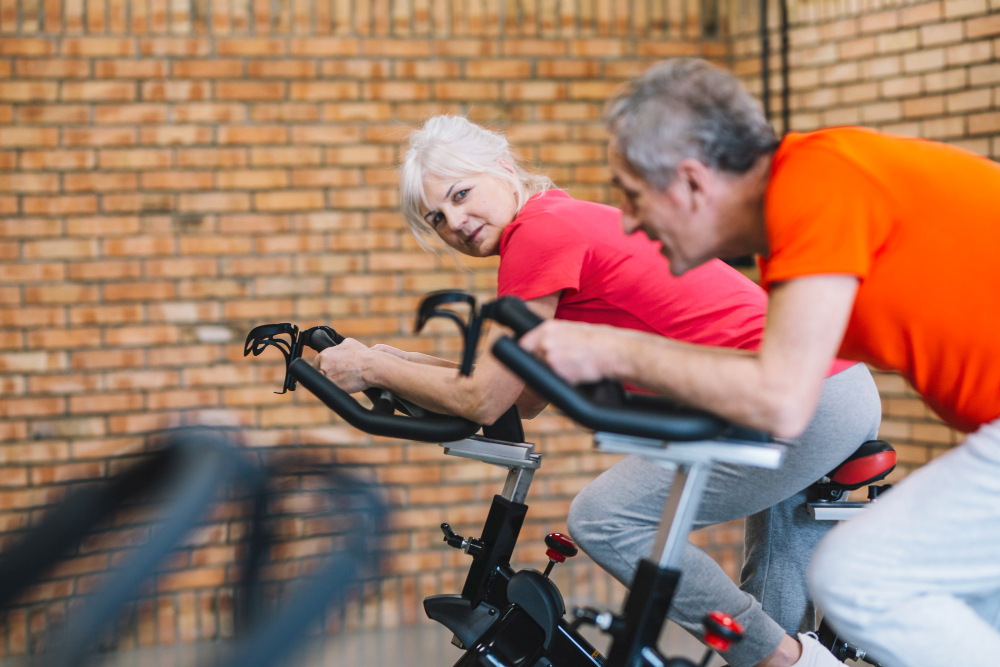


Although morning workouts provided benefits, only evening workouts provided progress in short-term blood pressure control (photo: Freepik*)
Published on 03/24/2025
By Maria Fernanda Ziegler | Agência FAPESP – Aerobic exercise in the evening brought more benefits for the regulation of blood pressure in older hypertensive patients than morning exercise. A study conducted at the School of Physical Education and Sport of the University of São Paulo (EEFE-USP), in Brazil, found that the reason is related to better regulation of a mechanism that compensates for sudden changes in blood pressure, known as baroreflex sensitivity.
“There are multiple mechanisms for regulating blood pressure, and, although morning workouts provided benefits, it was only evening workouts that provided advances in short-term blood pressure control – improving baroreflex sensitivity. This is important because, in addition to baroreflex control triggering positive effects on blood pressure control, there are no drugs available to modulate this mechanism,” Leandro Campos de Brito, author of the article published in The Journal of Physiology, told Agência FAPESP.
The work is the result of Brito’s post-doctoral project, supported by FAPESP and supervised by EEFE-USP professor Cláudia Lúcia de Moraes Forjaz.
In the experiment, 23 patients with diagnosed and medicated hypertension were divided into two groups: morning or evening workouts. Over the course of ten weeks, both groups exercised three times a week for 45 minutes at moderate intensity on an exercise bike.
Key cardiovascular parameters were analyzed, including systolic and diastolic blood pressure (blood pressure in the vessels) and heart rate (heartbeat) after ten minutes of rest. The data were collected before and at least three days after the volunteers completed the ten-week exercise program.
In addition, the researchers monitored both autonomic nervous system mechanisms – which work involuntarily to control things like heartbeat and blood pressure – as well as muscle sympathetic nerve activity (which regulates peripheral blood flow by contracting or relaxing vessels in muscle tissue) and sympathetic baroreflex sensitivity (assessing blood pressure control through changes in muscle sympathetic activity).
Those who worked out in the evening showed an improvement in all four aspects analyzed: systolic and diastolic blood pressure, sympathetic baroreflex sensitivity, and muscle sympathetic nerve activity. Those who worked out in the morning had no reduction in muscle sympathetic nerve activity, no improvement in systolic blood pressure, and no improvement in sympathetic baroreflex sensitivity.
“Training in the evening was more effective in promoting cardiovascular autonomic improvement and lowering blood pressure. This can be partly explained by improved baroreflex sensitivity and reduced muscle sympathetic nerve activity, which were greater in the evening. For the time being, we only know that baroreflex control is the defining factor, at least from a cardiovascular point of view, for evening workouts to be more beneficial than morning workouts, as it is this that triggers the other benefits analyzed. However, we still have a long way to go to understand this,” explains Brito, who is currently a professor at the Oregon Institute of Occupational Health Sciences at Oregon Health & Science University in the United States and continues to explore the issue through studies on circadian rhythm.
The researcher points out that baroreflex control regulates each heartbeat and controls the body’s autonomic activity. “It’s a mechanism that’s linked to sensitive fibers, to deformations of the artery walls, which are located in certain places, such as the aortic arch and the carotid body. So when the pressure drops, this region sends information to the area of the brain that controls the autonomic nervous system, which in turn sends information back to the heart to make it beat faster and to the arteries to make them contract more. If the pressure rises, it sends information to the heart to beat more slowly,” he explains.
In a previous study, the USP research group showed that aerobic exercise performed in the evening resulted in a greater reduction in blood pressure than morning exercise in hypertensive men (read more at: agencia.fapesp.br/34194).
In another study, the more effective blood pressure-lowering response of evening exercise was also associated with greater reductions in systemic vascular resistance and systolic blood pressure variability (read more at: agencia.fapesp.br/37432).
“The replication of results obtained in previous studies and in different groups of patients with hypertension, combined with the use of more precise techniques to assess key outcomes, strengthens our understanding of a greater autonomic benefit of aerobic exercise performed in the evening in patients with hypertension. This may be particularly important for individuals who are resistant to drug treatment,” he says.
The article “Evening but not morning aerobic training improves sympathetic activity and baroreflex sensitivity in elderly patients with treated hypertension” can be read at: physoc.onlinelibrary.wiley.com/doi/10.1113/JP285966.
Source: https://agencia.fapesp.br/54268